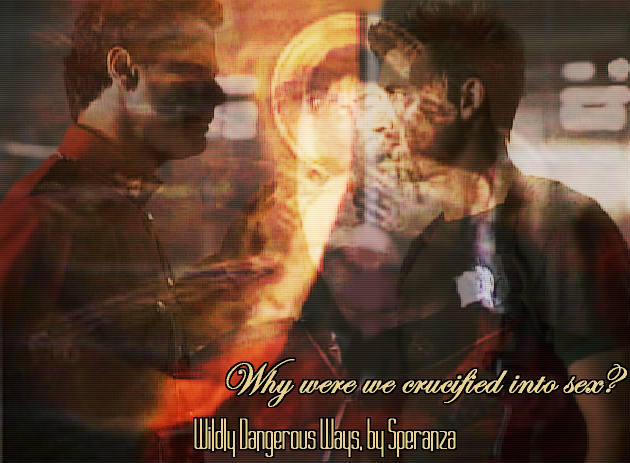
Have a quote:
I find myself reading rather a lot of D.H. Lawrence. He's hardly a model
for healthy
sexuality--the man was a narcissist, and he was clearly obsessed with
his mother.
Then again, I'm more than a little obsessed by my own mother, so who
am I to
sit in judgment?
In any case, I find the trepidation with which Lawrence approaches sexual
matters to be--well, quite moving, really.
Why were we crucified into sex?
Why were we not left rounded off, and finished in ourselves,
As we began,
As he certainly began, so perfectly alone?
I look up, over the snowy landscape before me, at the distant mountains:
certainly here, on my father's porch, it is possible to imagine oneself
perfectly alone,
to imagine that one is the only person alive on the entire planet,
in fact. I think
about Saint Joan, in Shaw's play, comforting herself in her abandonment,
reminding herself that God is alone.
Diefenbaker barks sharply at me, and I turn to look at him. All right,
Dief, yes. Obsessed
with my mother, and a bit of a narcissist, too. Point taken.
I smile and return to the poem, reading slowly, not wanting to miss
a word. I find both
terror and wonder in Lawrence--he is connected to life in the largest
sense, and yet he fears both its joys and its pains.
I remember, when I was a boy,
I heard the scream of a frog, which was caught with his foot in
the mouth of an up-starting snake;
I remember when I first heard bull-frogs break into sound in the
spring;
I remember the heifer in her heat, blorting and blorting through
the hours, persistent and irrepressible;
I remember my first terror hearing the howl of weird, amorous cats--
Dief barks again, and again I look up. "What, Dief, what? I'm trying
to read this."
Dief bounds up the steps where I'm sitting and brushes past me, thwacking
me
in the face with his tail. "All right, that's enough. What's the matter
with you?"
Dief flops down beside me and gives me a feral look. "You are not bored!"
I say,
shocked. "Don't be ridiculous! Look at that!" I fling my hand out:
the
entire natural world, literally on our doorstep. "Go! Run! Chase something!"
Dief doesn't move, just thumps his tail once. "No," I say sharply, "there
are no Ring
Dings here, as you well know." I raise my hand again and point toward
a
string of distant trees. "Go. Kill something. You're a wolf." Dief
doesn't move, but
he's not howling either, so fine, be that way. I return to my book
with a sigh.
Where was I?
I remember my first terror hearing the howl of weird, amorous cats;
I remember the scream of a terrified, injured horse, the sheet-lightning,
And running away from the sound of a woman in labour, something
like an owl whooing,
And listening inwardly to the first bleat of a lamb,
The first wail of an infant,
And my mother singing to herself--
Well, there you go. It really wouldn't be Lawrence without his mother
coming
into it somewhere. I close my eyes and remember my own mother singing.
You made me love you.
I didn't want to do it. I didn't want to do it.
And really, knowing my father as I now do, I can see why she wouldn't have wanted to--
Dief howls and I'm about ready to hurl my book at his fat head. Except,
I realize
a second later, it isn't Dief--it's further off, it's another wolf.
I open my eyes and
Dief is up, on his feet, wildly at attention--and then he's running,
paws
flying, across the snow and into the trees. Good. Goodbye.
I shake my head and return to the poem.
The cross,
The wheel on which our silence first is broken,
Sex, which breaks up our integrity, our single inviolability, our
deep silence,
Tearing a cry from us--
I jerk my head up and look for Dief, suddenly suspicious. I listen intently,
but I
don't hear anything--well, I hear a lot, actually: sandpipers, owls,
what sounds
like a lost moose, but no copulating wolves, thank God. I take a deep
breath and resume reading.
Sex, which breaks up our integrity, our single inviolability, our
deep silence,
Tearing a cry from us--
Sex, which breaks us into voice, sets us calling across the deeps,
calling, calling for the complement,
Singing, and calling, and singing again, being answered, having
found.
Torn, to become whole again, after long seeking for what is lost,
The same cry from the tortoise as from Christ, the Osiris-cry of
abandonment,
That which is in whole, torn asunder,
That which is in part, finding its whole again throughout the universe.
And I have to close my eyes, and replay those final lines in my head.
The Osiris-cry of
abandonment. That which is in part, finding its whole again throughout
the universe.
I put the book down beside me and cover my face with my hands, even
though
there is no one here to see me, even though I am so perfectly alone.
*